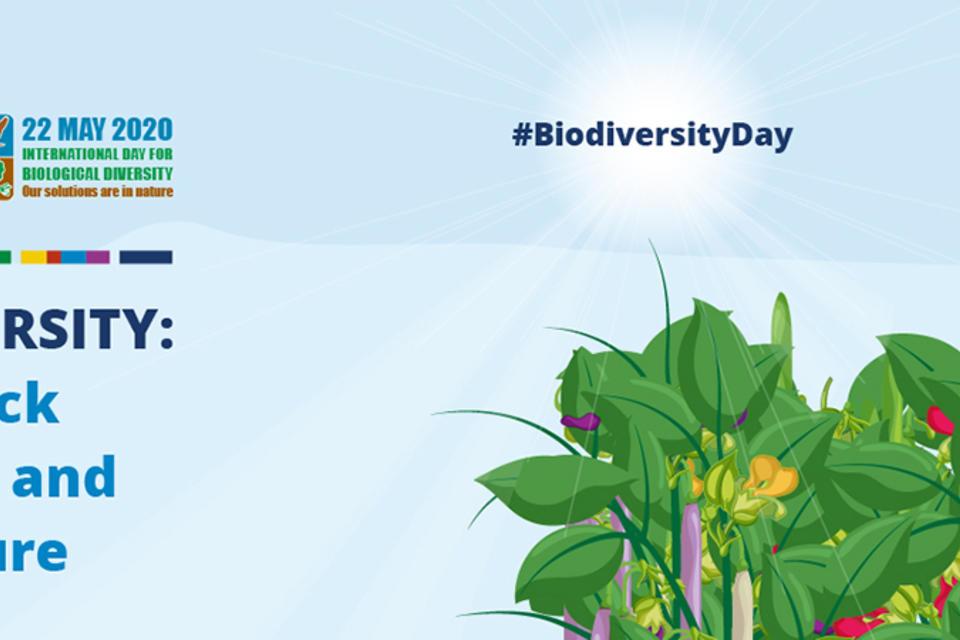From the Field From the field: how on-farm biodiversity is transforming community livelihoods in Kenya
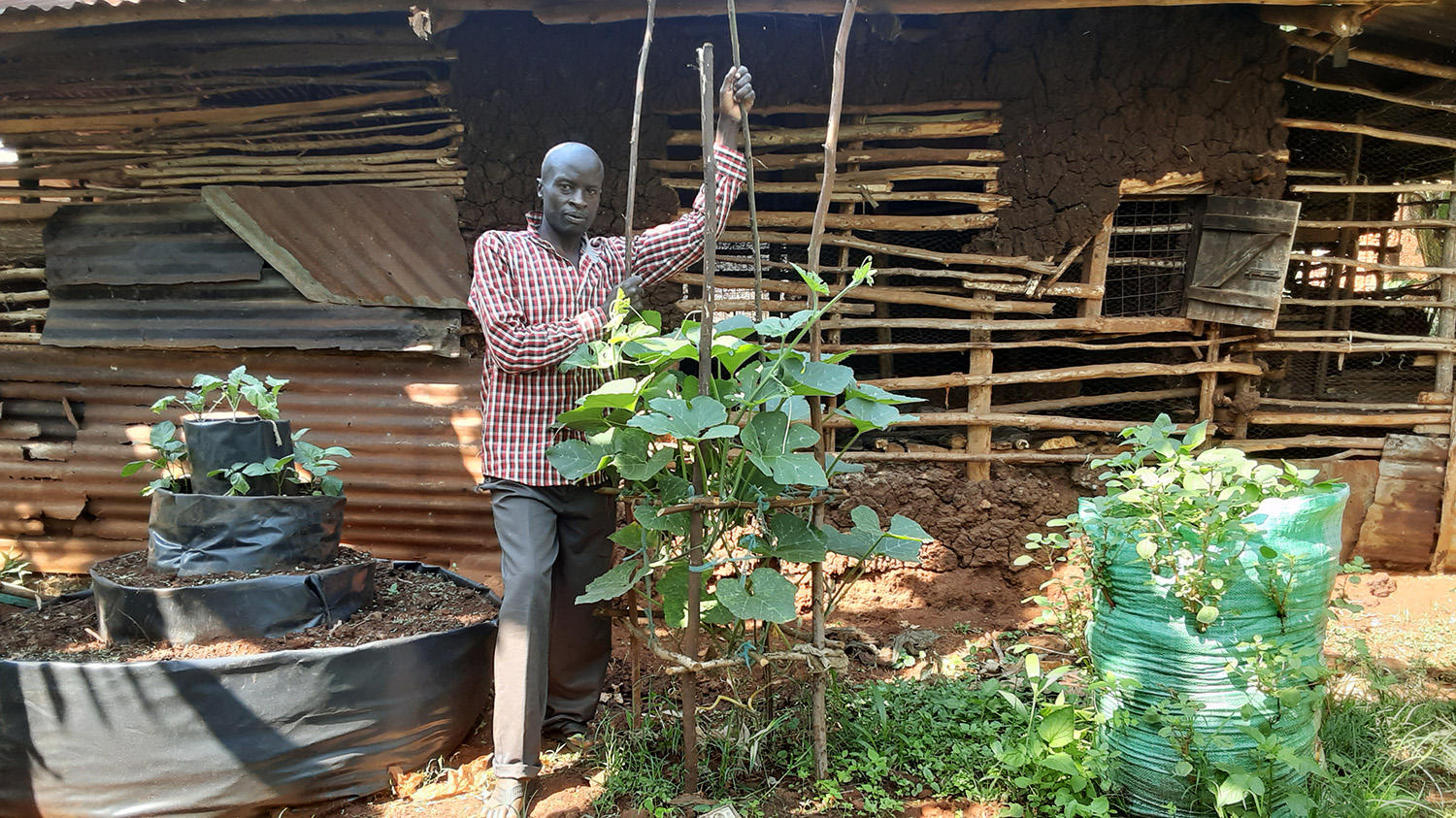
A farmer describes how Alliance work implementing agriculture, nutrition and livelihood projects in Vihiga County has impacted his life since 2016.
Smallholder farmers in Vihiga County (Western Kenya) cultivate maize and beans as major food crops on an average of 0.4 hectares of land, similarly to most rural Kenyan households[1].
For over five years the Alliance (formerly operating as Bioversity International) has engaged the local community to identify challenges such as low dietary diversity, minimal incomes and livelihoods, and worked closely with community groups to develop options that can close these gaps.
Joseck Mukuna is a resident smallholder farmer based in the sublocation of Essunza. Like many other farmers in Vihiga County, he has faced the challenges of limited farmland, poor harvests, food and nutrition insecurity. On his small plot measuring only 0.1 ha Joseck has prioritized maize farming, like many of his neighbors. After four months of growth, this maize yields a maximum of one and half bags; which translates to around $45 per season, hardly enough to sustain his family (Joseck and his wife, Madina Mang’oli, have three children aged between 9-15 years).
Luckily for Joseck, he was one of the farmers engaged in the Alliance’s first intervention phase, in 2016.
With support from the Alliance, the community identified various interventions including kitchen gardening, poultry-rearing, legume farming and nutrition education. In addition, we also supported the community groups to develop their own action plans and activities in line with their selected interventions,” explains Alliance researcher Lillian Aluso.

Alliance projects work closely with community-based farmer groups. Credit: Lillian Aluso
The first project ‘Participatory Approaches for Improving Dietary Diversity’ was implemented in five community groups within the sub-locations (Essunza, Itumbu, Wanondi, Mambai and Masana). This was done in collaboration with local partners Sustainable Organic Farming and Development Initiatives (SOFDI), Western Region Agricultural Technology Evaluation (WeRATE) and the County Government of Vihiga (Departments of Health and Agriculture). Commissioned in 2014, the main goal of the flagship project was to support the communities to develop and implement their own agriculture for nutrition interventions to improve dietary diversity.
Joseck is one of the founding members of the Essunza Bioversity Self Help Group; an initial beneficiary of the project. The project took an integrated community-based approach, where the beneficiaries were actively involved in identifying, developing and implementing intervention activities.
Capacity Building
Collaborating with local partners and county government, the Alliance team conducted training and capacity building; for example, supporting the community groups in establishing demonstration plots where, after receiving a series of trainings on adoption of smart technologies in kitchen gardening and poultry rearing, members were required to adopt the same technologies on their own farms. The Essunza Bioversity Self Help Group focused on growing traditional African leafy vegetables (TLVs) and poultry-rearing.
Smart farming
Joseck soon realized that with the short TLV growing cycle, he would make a profit of $2 per day ($60 per month) after taking care of all his costs. He gladly notes that, taking into consideration labor and farm input requirements, the small plot he now uses for vegetable farming gives him much better returns compared to maize.
In the four months that I would otherwise be waiting to harvest my maize, I can make $240. Besides being able to buy maize as well as other foods for my family consumption, I am comfortably paying tuition fees for my children; two are in high school,” he explains.
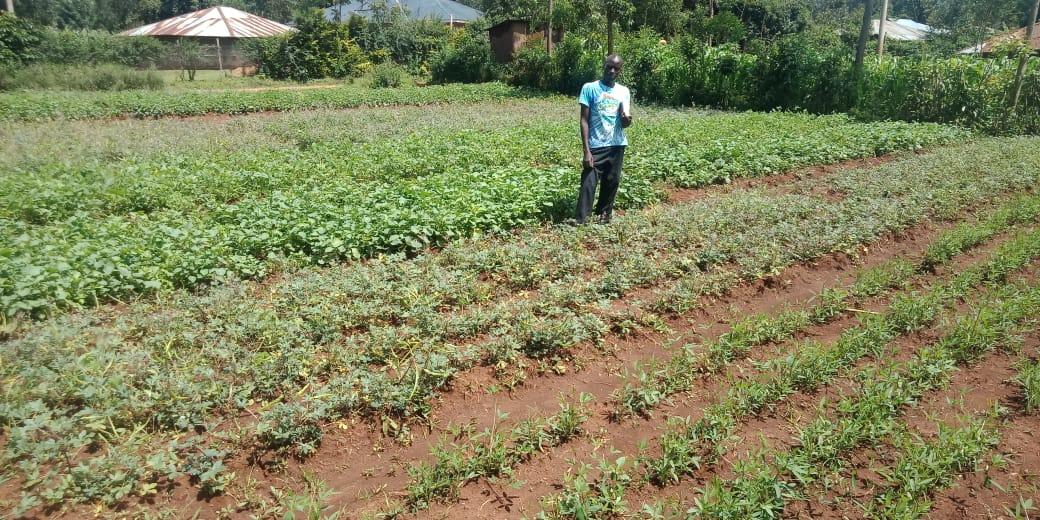
Joseck grows TLVs in one of his rented kitchen gardens. Credit: Lillian Aluso
There is notably high demand for TLVs in the area. Joseck cites several occasions when his production could not meet the market demand; thereby presenting a new business opportunity. To meet the growing needs of his customers, he resorted to leasing plots in his neighborhood to expand his vegetable production. Currently, he has leased six plots amounting to 0.8 ha.
Joseck now grows a variety of species that includes black nightshade, crotalaria, spider plant, jute mallow, cowpea leaves, pumpkin leaves, Ethiopian kale and amaranth, which has allowed him to meet the needs and preferences of different customers.
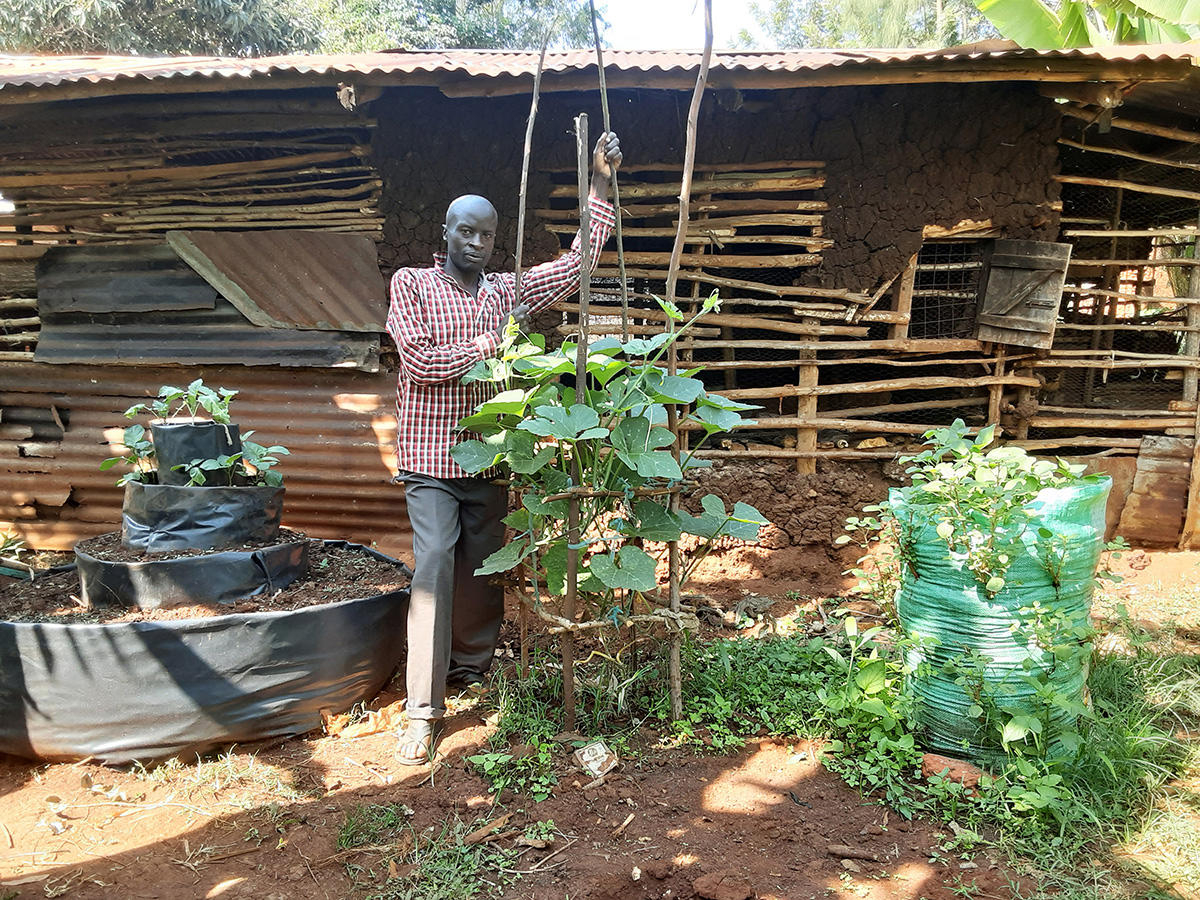
Joseck displays different climate-smart cultivation methods on his farm. Credit: Lillian Aluso
Today Joseck is a respected role model in his community, and feels that his journey with the Alliance has been one of continuous learning and economic growth.
We have received many trainings and our capacity has been built in other areas as well such as group dynamics, leadership and record keeping. Vegetable farming is now my passion and I grow different varieties of TLVs. In addition to traditional vegetables, I also keep an improved breed of chicken,” he adds.
Mentoring the community
To give back to the community, he organizes nutrition education forums where he enlightens people on importance of dietary diversity for good nutrition and health. He also uses his farm to demonstrate and mentor other aspiring farmers to adopt smart technologies for domestic and commercial vegetable farming. From these community engagements, he has enhanced his network and created new market linkages with local schools and hospitals.
In addition to his success on the farm, Joseck has been nominated on several occasions to attend exchange visits, forums and conferences where he has gained tremendous exposure.
“I was even sponsored by Bioversity International to attend the Agrinutrition Conference in Nairobi in September 2019. I felt greatly honored for the opportunity and I learned a lot,” he adds excitedly.
An Improved Livelihood
As a family man, Joseck proudly notes that his family is now healthier as he is able to buy other nutritious foods for them such as animal source foods. Additionally, he now harvests his own TLV seeds and no longer buys from the market. He is confident about the quality of the seeds he is using and able to conserve most of the species and varieties he has been growing over time.
I have been harvesting seeds my way, but now with the community seedbank coming up, The Alliance/Bioversity International is facilitating our trainings on proper seed multiplication, harvesting and storage. We are learning a lot of new things about seeds,” he says.
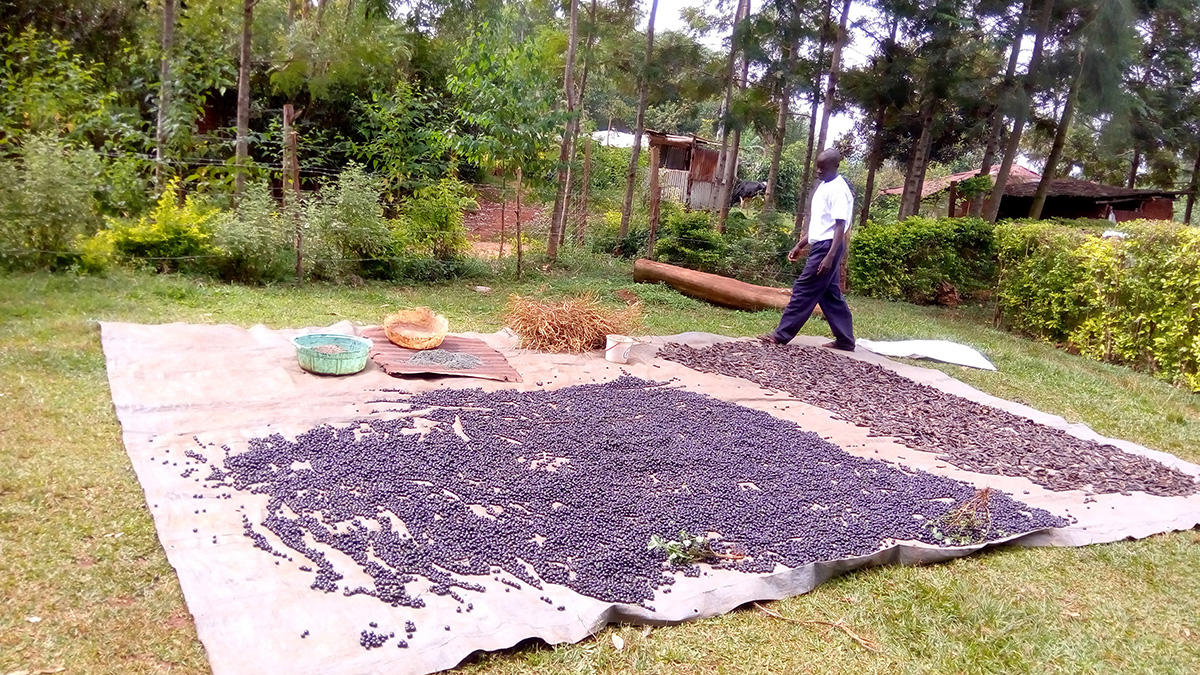
Joseck dries seeds to save in his compound. Credit: Lillian Aluso
The successful farming venture hugely boosted Joseck’s confidence and influence in the community. He is no longer shy to try out new things and apply his creativity. He has noticed that many people are interested in interacting with him: “They want to be like me, they come to my home and ask me to show them how to do different things,” he says with a smile.
Despite the success, Joseck cautions that managing a kitchen garden has its own challenges too. He cites the example of increased cost of inputs, charges for the rented plots and the occasional added labor costs, such as when he has to hire laborers to help him with the work especially during land preparation and weeding. Like other agricultural products, TLVs are also not immune to pest attacks, but thankfully, the Alliance, through local partners, has facilitated the group in attending training on integrated pest management, which has helped significantly. Ongoing climate change has resulted recently in unpredictable weather patterns, which affects the whole cycle of planting TLVs.
“You have to learn by doing, and that has helped me a lot. It is hard work but it pays. So many visitors come to see my farm now,” Joseck says of his experience. He calls on his fellow farmers in the community-based organization to be consistent and keep implementing all they have learned from the Alliance.
“It is only by doing these things over and over that we will have sustainability. We are grateful to the Alliance for supporting us to put up a community seed bank. This will provide an excellent opportunity for us to conserve our indigenous varieties of TLVs, which we were almost losing. Farmers in Vihiga County will also be able to exchange seeds and learn about seed multiplication and preservation,” he concludes.
More about the project
The current project “Improving access to and benefits from a wealth of diverse seeds to support on-farm biodiversity for healthy people in resilient landscapes”, funded by Biovision, has been ongoing since 2018. Building on the positive experiences from the previous project, this project expanded the agriculture for nutrition interventions to ten community groups. The aim of the project is to promote community-led conservation and use of a wealth of diverse seeds to support on-farm diversity, production of year-round diverse foods, incomes and dietary quality. The Alliance of Bioversity International and CIAT has also supported the ten community groups to form one community-based organization (CBO) and is in the process of guiding them to establish a community seed bank.
This research was conducted as part of the CGIAR Research Program on Agriculture for Nutrition and Health (A4NH), and is supported by contributors to the CGIAR Trust Fund as well as by Biovision.

See also
[1] County Government of Vihiga (2018). County Integrated Development Plan 2018-2022.

